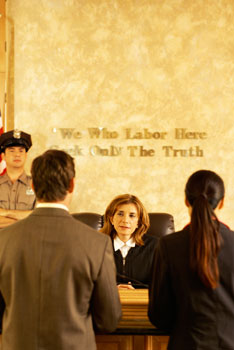 Feb. 24, 2014 – The Wisconsin Judicial Code would specifically authorize judges to give litigants, including self-represented litigants, information or use techniques to simplify legal proceedings, under a petition that received a public hearing today at the state supreme court.
Feb. 24, 2014 – The Wisconsin Judicial Code would specifically authorize judges to give litigants, including self-represented litigants, information or use techniques to simplify legal proceedings, under a petition that received a public hearing today at the state supreme court.
The supreme court also heard testimony on a petition that would authorize the Office of Lawyer Regulation (OLR) to post public notice on its website when a lawyer is being formally investigated for alleged ethical misconduct (see more on this petition from a recent article in WisBar InsideTrack).
The court did not discuss either petition as public hearings consumed the entire day and left no time for an administrative conference. Thus, the court will hold both petitions for consideration at a later date.
Judges Turn Out to Support Pro Se Petition
Numerous Wisconsin judges and attorneys appeared in support of petition 13-14, which would amend and create Wisconsin Judicial Code rules to make clear that judges can take “reasonable efforts” to facilitate the ability of all litigants, including self-represented litigants, to be fairly heard.
The petition, submitted by the Wisconsin Access to Justice (ATJ) Commission in 2013, recognizes the significant number of Wisconsin citizens who enter court proceedings each year without a lawyer, especially in family law cases.
It largely codifies the sorts of discretionary acts that many judges are already using, explained former Appeals Court Judge Margaret Vergeront, who testified for the ATJ Commission.
Specifically, judges could use their discretion in “using techniques that enhance the process of reaching a fair determination in the case.” Judges who don’t want to take such measures would not be required as the proposed language simply allows judges to use their discretion. It also aplies to "all litigants," not just pro se litigants.
For instance, judges could take reasonable steps to explain legal concepts in everyday language, provide information about the proceedings, or permit narrative testimony, among other actions included within the petition’s non-exhaustive list.
Judges, attorneys, and associations support the petition as a way to improve access to justice for the increasing number of self-represented litigants and create efficiencies for judges and commissioners who hear their cases.
The State Bar of Wisconsin supports the petition, as does the Wisconsin Trial Judges Association, the Wisconsin Committee of Chief Judges, the Court of Appeals, and the Wisconsin Association of Judicial Court Commissioners, among others.
Appeals, circuit, and municipal court judges testified in support of the petition at today’s public hearing, including Jeffrey Kremers, chief judge of the Milwaukee County Circuit Court. State Bar President Patrick J. Fiedler also testified in support of the petition, noting that the State Bar’s Board of Governors voted 37-3 to support it.
Kremers and other judges said the rule simply authorizes what many judges across the state are already doing to address the high volume of pro se litigants, and judges who are hesitant to use such techniques would have assurance that the rules allow it.
Justice Patience Roggensack raised concern that the proposal undermines the adversarial system, questioning how far judges could go in helping pro se litigants.
“I see a lot of problems,” Justice Roggensack said. “It may be that we need to change our system, but what you are portraying is not an adversarial system. I have concern that our courts could be turned into social service agencies.”
Chief Justice Shirley Abrahamson seemed to support the proposal. She suggested the best solution is allowing court appointed counsel in civil cases, but that solution is not currently achievable given the costs involved. “If we can’t do the best thing, we should not be stopped from doing something,” the chief justice said.
Milwaukee County Circuit Court Judge Mary Kuhnmuench said the proposal addresses a "changed landscape.” Historically, litigants had lawyers, and judges are now dealing with a massive number who do not.
“That’s the bench now,” Kuhnmuench said. “We better recognize it and figure it out.”
Michael Gonring, a partner at Quarles & Brady LLP in Milwaukee and long-time advocate for access to justice initiatives and pro bono programs, said a represented side, in his experience, is grateful when a judge makes efforts to inform a pro se litigant.
“I do not see this as an assault on the adversarial system at all,” Gonring said. “Cases involving pro se litigants can get messy, and we hope the judge takes control and makes things easier because that makes things easier for us and our clients.”
